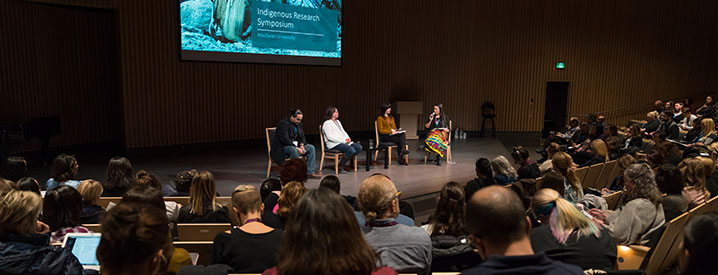On November 14, MacEwan University and University nuhelot'ine thaiyots'i nistameyimâkanak Blue Quills hosted the first Indigenous Research Symposium, bringing together 200 post-secondary students, academics, researchers and members of the public.

Researchers Mylan Tootoosis, Dr. Claudine Louis and Amanda McLellen participate in a panel discussion on navigating western processes in Indigenous research, moderated by MacEwan's Amber Dion.
At 8 a.m. - before beginning a full day of complex discussions woven around relationship, respect and reciprocity in research - Elder Frances McAdam Saysewehum opened the symposium with a pipe ceremony, followed by a morning song from Kurtis McAdam, an Indigenous knowledge keeper at MacEwan.
"It's important to begin a serious discussion like this in this way," said morning keynote speaker Dr. Blair Stonechild, a professor of Indigenous Studies at First Nations University of Canada.
Ceremony, said the internationally recognized researcher, is about bringing people together and asking for guidance. In a research context, beginning with ceremony is about asking Elders about the purpose and intent for the research - to have good intentions, to proceed with sincerity, humility and respect, to focus on relationships between people and all other parts of creation, and to do no harm.
"Indigenous research approaches things from a framework of spirituality," said Stonechild, whose academic work aims to decolonize Indigenous spirituality. "Its primary consideration is not methodology or data collection but the implications of the work."
Benefiting communities and future generations
Taking the Indigenous approach of focusing first on how research might benefit communities and the coming generations isn't always consistent with the research approach taken toward research in colonial institutions, including universities. Researchers in the symposium's two panels spoke about the challenges of navigating western processes in Indigenous research and shared their perspectives on research and the Truth and Reconciliation Commission's calls to action. Themes included acknowledging the accountability that Indigenous researchers have to their communities, the importance of connections, addressing ongoing colonialism and challenges related to research funding.
"In western structures, funding limitations will sometimes prevent a relationship from continuing," explained panelist Dr. Claudine Louis, president of Maskwacis Cultural College. "The expectation of Elders and traditional knowledge holders is that once you engage in a relationship, that relationship is for life - not just until the funding runs out after 18 months. There's an ethical choice you must make as a researcher to continue that relationship and nurture and support it, or to ignore it."
Mobilizing and taking back control
The symposium ended with a closing keynote from Dr. Rebecca Sockbeson, a professor of Indigenous peoples' education and education policy at the University of Alberta. As she spoke of mobilizing Indigenous knowledge and the importance of Indigenous people taking back control of the narratives and research surrounding their histories, she recounted a pivotal moment from early in her career.
"As part of my doctoral research, I analyzed a colonial document outlining the bounty for killing the Indigenous people of the Waponahki Confederacy in the eastern United States, where I'm from," she said. "And as I was engaging with this colonial document, I realized it marked the first time in the history of my people that a Waponahki person was doing an analysis of the bounty, and the first time it was being published. That's how subjugated this document is - the genocide that has occurred here in North America has been very much hidden."
Bringing research out into the open is one of the reasons why events like the symposium are so important, added Sockbeson. "Colonization did not intend for us to come together and talk about any of this, so these gatherings are an important act of anti-colonialism."
Terri Suntjens, kâ-nêkânêstahk iyiniw pamihtamowina - director of Indigenous initiatives at MacEwan, closed the event by talking about the important role that ceremony has played in her team's work at the university.
"We've accomplished a lot through the guidance of our ancestors," she said. "People have asked how we've done what we've done, and our team's answer is always the same: we've grounded everything we've done in ceremony. We have maintained relationships, not only with Indigenous people and communities, but with our ancestors in ceremonies. They have guided this process, and will continue to guide the work that we do."
This important work will continue in many ways, including MacEwan's third annual Interdisciplinary Dialogue set to begin in January that will spend the first month of 2019 focusing on Indigenous research.









